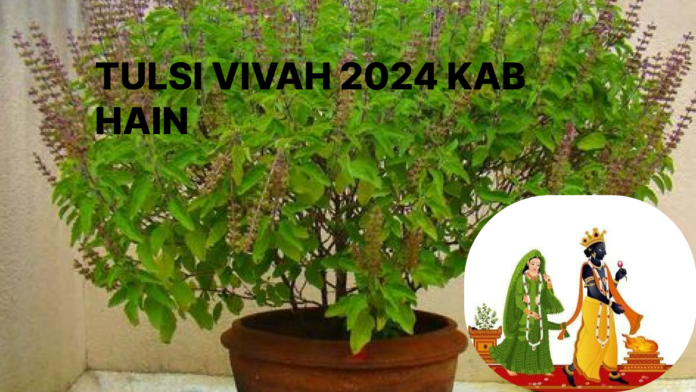Tulsi Vivah holds immense significance in Sanatan Dharma and is celebrated annually during the month of Kartik. Devotees observe a fast and worship Lord Shaligram along with Goddess Tulsi on this day. With just a few days left for this holy festival, let’s look at the important details, including the worship method and auspicious timing.
Importance of Tulsi Vivah and Auspicious Timing
Tulsi, or the holy basil, is revered in Hinduism, and having a Tulsi plant at home is considered highly auspicious as it is believed to bring happiness and prosperity. It is also said that Goddess Lakshmi resides within it.
Each year during Kartik, the symbolic wedding of Goddess Tulsi and Lord Shaligram (a form of Lord Vishnu) is conducted considered highly sacred in Sanatan Dharma. Devotees fast on this day and perform rituals to honor both Tulsi and Lord Shaligram.
Puja Items for Tulsi Vivah
Diya , Agarbatti, Dhoop, Kapoor, Sahad, Itra ,Haldi (P) White Til, Chane Ki dal, Shaligram, Chunri, 16 Shringar,Akshat, Supari, Laung Ilachi, Gangajal, Pooja Batti, Kalawa, Janeu, Chandan,Kumkum, Kalash,Haldi Ganth, Tulsi Vivah Katha Book, Mishri, Hawan Samagri, Hawan Samidha.
Tulsi Vivah Date and Shubh Muhurat
According to the Hindu calendar, the Dwadashi tithi (twelfth day) of Kartik month begins on Tuesday, November 12, 2024, at 4:02 pm and ends on Wednesday, November 13, 2024, at 1:01 pm. This year, Tulsi Vivah will be observed on November 13, based on the auspicious timings provided by the Panchang.
Worship Rituals (Puja Vidhi) for Tulsi Vivah
On the day of Tulsi Vivah, devotees should wake up early, ideally during the Brahma Muhurta, and take a bath. Wear red or yellow clothes, and clean the prayer room. To awaken Lord Vishnu, ring a conch shell or bell and chant mantras. Offer your prayers and prepare for the evening rituals by decorating the home or temple with lamps.
In the evening, during dusk, arrange for the marriage of Lord Shaligram and Goddess Tulsi. Set up a decorative pavilion and perform the 16 adornments (shringar) for Tulsi. Dress Lord Shaligram with Gopi Chandan (a type of sacred clay) and yellow clothes. Offer flowers, garlands, fruits, Panchamrit (a mixture of five sacred items), incense, lamps, red chunri, beauty items, and sweets.
Follow these You tube channels for more detail
Conclude the worship with an aarti and seek forgiveness for any mistakes in the rituals. Finally, distribute prasad among family members and guests. You may seek guidance from family elders or a knowledgeable priest to perform the rituals correctly.
